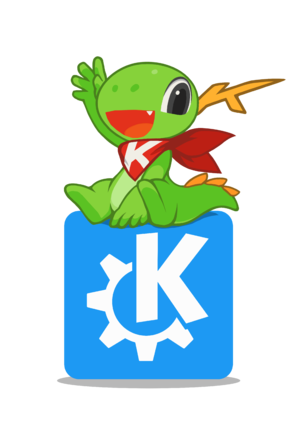Welcome to KDE: Difference between revisions
m add Discuss |
|||
| Line 8: | Line 8: | ||
== Learn the basics == | == Learn the basics == | ||
Though Plasma and KDE apps are designed to be intuitive and easy to learn, some things might feel different or strange. You can learn some of the basics at https://userbase.kde.org/Common_Tasks. | Though Plasma and KDE apps are designed to be intuitive and easy to learn, some things might feel different or strange. You can learn some of the basics at https://userbase.kde.org/Common_Tasks. | ||
== Find great KDE apps == | == Find great KDE apps == | ||
Revision as of 01:08, 11 March 2024

Welcome to the community of KDE, an international technology cooperative dedicated to producing the world's finest free software! KDE was founded in 1996 and has since grown into one of the largest and oldest free software communities in the world. For more information, read the KDE Manifesto and the history of KDE.
KDE community members and contributors use a lot of diverse systems and websites to conduct their business. When you're just getting started, it can be hard to know what resources are available and find them all. This page explains everything.
Learn the basics
Though Plasma and KDE apps are designed to be intuitive and easy to learn, some things might feel different or strange. You can learn some of the basics at https://userbase.kde.org/Common_Tasks.
Find great KDE apps
KDE produces a vast library of software for practically all purposes, from playing music to professional painting. You can see all of them at https://apps.kde.org. If you're using KDE Plasma, you can also find KDE apps by opening the Discover app and searching for "KDE".
Follow what's going on
There are many ways to get information about what's going on in the world of KDE!
- https://dot.kde.org (often known as The Dot) is the authoritative source of general KDE-related news and announcements. It does not include release announcements for KDE software; for that, see https://kde.org/announcements.
- The kde-community mailing list is a low-traffic list used for announcements and generally useful information for KDE users and community members.
- KDE's Promo team maintains KDE's social media presence with the following accounts:
- PeerTube: https://tube.kockatoo.org
- YouTube: https://www.youtube.com/c/KdeOrg
- Mastodon: https://floss.social/@kde
- Twitter: https://twitter.com/kdecommunity
- https://planet.kde.org is an aggregator of blogs by KDE community members where you can find out what people are doing.
- https://discuss.kde.org is our forum where you can share and read new ideas, ask the community for help or view other people's pretty desktops - just no name a few things
Get help & support
There are many ways to get help when you encounter an issue. See https://kde.org/support for details.
Get involved
Want to start contributing to KDE? Fantastic! Check out the Get Involved page. Most activities will require a KDE Identity account, which will let you log onto many KDE websites and services. You can get one at https://identity.kde.org.
A lot of communication in KDE takes place over email, using mailing lists. At a minimum, you should subscribe to the kde-community mailing list, mentioned earlier. Those interested in software development are highly encouraged to also subscribe to kde-devel.
Other mailing lists can be found at https://mail.kde.org/mailman/listinfo.
If you would like an email alias using the @kdemail.org domain, see Infrastructure/Email
Chat
A lot of other communication takes place on real-time chat, using the Matrix protocol. You can access a Matrix web client at https://webchat.kde.org/#/welcome, or use a Matrix desktop client. KDE has its own: NeoChat.
Video meetings
For video meetings and conferencing, KDE uses https://meet.kde.org, which is a self-hosted instance of the BigBlueButton software. You can create new meetings yourself there; to attend a meeting, you will typically be given a link to it.
Task tracking
- Most task tracking for teams of KDE contributors takes place on https://invent.kde.org, which is a self-hosted instance of the GitLab software. You can see what teams are available for you to join at https://invent.kde.org/groups/teams.
- Some task tracking is still done on https://phabricator.kde.org, which has been mostly replaced by invent.kde.org. Phabricator is still used by some teams like Promo, Sysadmins, Akademy organizers, and the KDE e.V. Board. Phabricator will be decommissioned in the near future and should not be used for new teams.
File storage
KDE teams that need a persistent location to store useful files use https://collaborate.kde.org for this purpose.
Organization
The KDE community is legally represented by a German nonprofit organization: the KDE e.V. (which stands for "eingetragener Verein", meaning "registered association" in German). The KDE e.V. handles KDE's finances, contractors, trademarks, legal representation, and requests for reimbursement for costs incurred attending KDE events. For more information, see https://ev.kde.org.
- Information about development sprints can be found at Sprints.
- Requests for reimbursement can be submitted using https://reimbursements.kde.org.
